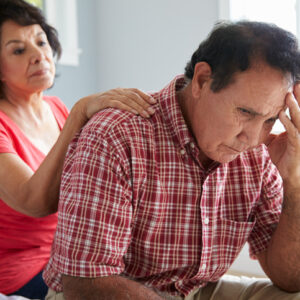Pandemic Support: Helping Older Adults Manage Anxiety
March 17, 2020 | Covid-19, Mental Health

Right now most of us are feeling unsettled or anxious about recent world events, including COVID-19, stock market fluctuations, and restrictions on travel and gatherings that may be keeping people apart form loved ones. Older adults may be feeling anxiety more than any other group right now since they are most vulnerable to complications from coronavirus, and are already at risk for social isolation. If you or a loved one is experiencing anxiety, then it is important to know about resources available for managing the condition.
Anxiety Affects More Than Mood
Anxious feelings are a normal response to unprecedented world events like a pandemic. Many non-medical interventions can help reduce anxiety such as meditation, connecting with friends and family via video chat, participating in daily exercise and/or maintaining spiritual practices. However, anxiety can get to the point where the symptoms are constant and may be debilitating. At that point, you may need to consult your doctor for help. Anxiety disorders are common in people 60 years and older, but unfortunately healthcare providers are not always quick to recognize the symptoms or offer assistance. And, it can be hard for older adults to advocate for themselves in this situation.
Anxiety affects much more than mood. When an older adult has anxiety, it can have a domino effect on a reduced quality of life, memory problems, and physical disability.
Generalized Anxiety Disorder is a risk, especially among adults who experienced anxiety in the earlier years of life. Additionally, the development of anxiety is often connected with a traumatic event, such as a life-threatening illness or an accident.
Symptoms of Anxiety in Older Adults
Watch for these common symptoms of anxiety, so you know when an older family member needs support:
- Difficulty breathing
- Sweating
- Nausea
- Confusion
- Irrational or obsessive thoughts
- Shakiness
- Chest pain
- Nightmares and/or changes in sleep patters
- Appetite problems and weight gain or loss
- Withdrawal or isolation
- Panic
- Substance misuse
- Compulsive behavior
- Avoidance of activities or people who trigger these symptoms
A person doesn’t need to have all of the above symptoms to be diagnosed with anxiety. If you or a loved one has one or more of these symptoms, then it might be time to talk to a doctor about treatment options.
Medical Care for Managing Anxiety
Keep in mind that anxiety symptoms should be managed differently for older adults versus younger people. A geropsychiatrist (a psychiatrist specifically trained to work with older adults) or another healthcare provider skilled in geriatrics should be involved in the diagnostic process. Telemedicine options have recently been expanded for Medicare recipients in response to the COVID-19 crisis. This may be the best resource right now as older adults are advised to stay home whenever possible.
We know this is a challenging time for many people, and older adults are especially vulnerable. Windward’s Clinical Team is available in person, by phone or by e-mail to consult around your specific needs. Contact us today if we can help.

